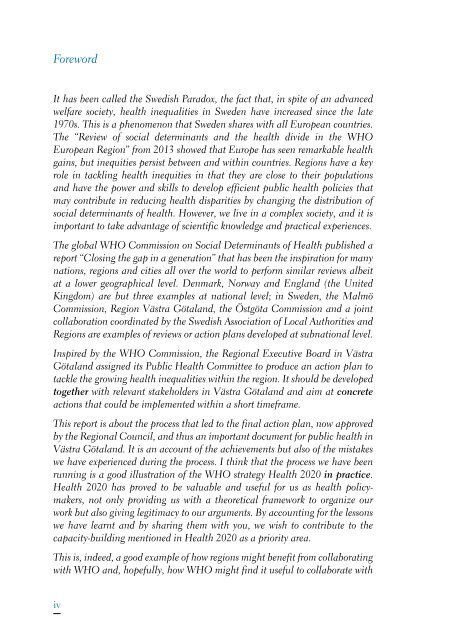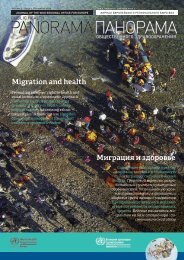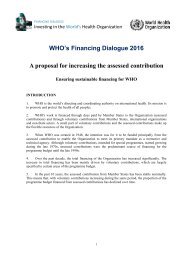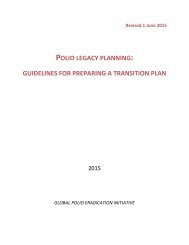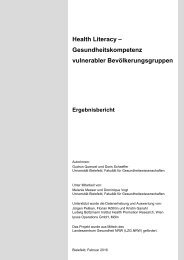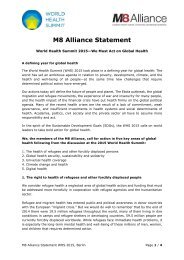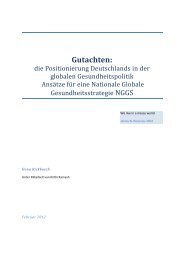Tackling-health-inequities-from-concepts-to-practice-The-experience-of-Vastra-Gotaland
Tackling-health-inequities-from-concepts-to-practice-The-experience-of-Vastra-Gotaland
Tackling-health-inequities-from-concepts-to-practice-The-experience-of-Vastra-Gotaland
- No tags were found...
You also want an ePaper? Increase the reach of your titles
YUMPU automatically turns print PDFs into web optimized ePapers that Google loves.
ForewordIt has been called the Swedish Paradox, the fact that, in spite <strong>of</strong> an advancedwelfare society, <strong>health</strong> inequalities in Sweden have increased since the late1970s. This is a phenomenon that Sweden shares with all European countries.<strong>The</strong> “Review <strong>of</strong> social determinants and the <strong>health</strong> divide in the WHOEuropean Region” <strong>from</strong> 2013 showed that Europe has seen remarkable <strong>health</strong>gains, but <strong>inequities</strong> persist between and within countries. Regions have a keyrole in tackling <strong>health</strong> <strong>inequities</strong> in that they are close <strong>to</strong> their populationsand have the power and skills <strong>to</strong> develop efficient public <strong>health</strong> policies thatmay contribute in reducing <strong>health</strong> disparities by changing the distribution <strong>of</strong>social determinants <strong>of</strong> <strong>health</strong>. However, we live in a complex society, and it isimportant <strong>to</strong> take advantage <strong>of</strong> scientific knowledge and practical <strong>experience</strong>s.<strong>The</strong> global WHO Commission on Social Determinants <strong>of</strong> Health published areport “Closing the gap in a generation” that has been the inspiration for manynations, regions and cities all over the world <strong>to</strong> perform similar reviews albeitat a lower geographical level. Denmark, Norway and England (the UnitedKingdom) are but three examples at national level; in Sweden, the MalmöCommission, Region Västra Götaland, the Östgöta Commission and a jointcollaboration coordinated by the Swedish Association <strong>of</strong> Local Authorities andRegions are examples <strong>of</strong> reviews or action plans developed at subnational level.Inspired by the WHO Commission, the Regional Executive Board in VästraGötaland assigned its Public Health Committee <strong>to</strong> produce an action plan <strong>to</strong>tackle the growing <strong>health</strong> inequalities within the region. It should be developed<strong>to</strong>gether with relevant stakeholders in Västra Götaland and aim at concreteactions that could be implemented within a short timeframe.This report is about the process that led <strong>to</strong> the final action plan, now approvedby the Regional Council, and thus an important document for public <strong>health</strong> inVästra Götaland. It is an account <strong>of</strong> the achievements but also <strong>of</strong> the mistakeswe have <strong>experience</strong>d during the process. I think that the process we have beenrunning is a good illustration <strong>of</strong> the WHO strategy Health 2020 in <strong>practice</strong>.Health 2020 has proved <strong>to</strong> be valuable and useful for us as <strong>health</strong> policymakers,not only providing us with a theoretical framework <strong>to</strong> organize ourwork but also giving legitimacy <strong>to</strong> our arguments. By accounting for the lessonswe have learnt and by sharing them with you, we wish <strong>to</strong> contribute <strong>to</strong> thecapacity-building mentioned in Health 2020 as a priority area.This is, indeed, a good example <strong>of</strong> how regions might benefit <strong>from</strong> collaboratingwith WHO and, hopefully, how WHO might find it useful <strong>to</strong> collaborate withiv


